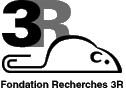
F. Roch-Ramel
Institute of Pharmacoly and Toxicology, University of Lausanne, 1005 Lausanne, Switzerland
francoise.roch-ramel@ipharm.unil.ch
Keywords: kidney; pharmacology; toxicology; cell cultures: organ-specific; reduction; toxicity testing: pharmaceuticals
Duration: 1 year Project Completion: 1999
Background and Aim
Hyperuricemia is a risk factor for gouty arthritis, and renal failure. As many compounds interfere with the renal transport of uric acid, a screening test is necessary to detect if newly developed drugs affect urate transport and, consequently, urate plasma levels. At present such a drug screening is performed with an in vivo method (uric acid renal clearance measurements) in rats and Cebus monkeys. Recently, a cell line originating from human kidney, which has transport characteristics from proximal tubule, has been developped. By growing these cells on a porous support, an epithelium is formed.
It is intended to use such an epithelium (analogue of human proximal tubule epithelium) to measure the transport of uric acid, and to investigate the effect of drugs known to interfere with uric acid excretion, in order to obtain an in vitro model of uric acid transport.